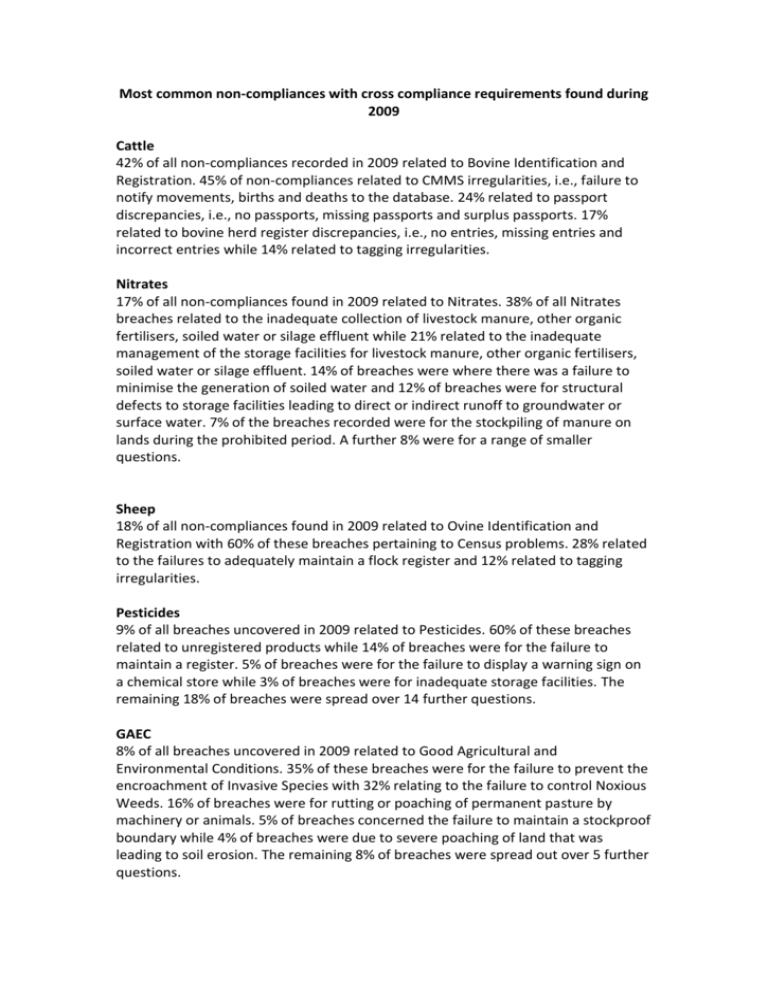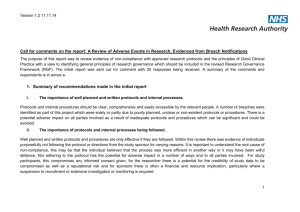Most Common Non-Compliance 2009
advertisement

Most common non-compliances with cross compliance requirements found during 2009 Cattle 42% of all non-compliances recorded in 2009 related to Bovine Identification and Registration. 45% of non-compliances related to CMMS irregularities, i.e., failure to notify movements, births and deaths to the database. 24% related to passport discrepancies, i.e., no passports, missing passports and surplus passports. 17% related to bovine herd register discrepancies, i.e., no entries, missing entries and incorrect entries while 14% related to tagging irregularities. Nitrates 17% of all non-compliances found in 2009 related to Nitrates. 38% of all Nitrates breaches related to the inadequate collection of livestock manure, other organic fertilisers, soiled water or silage effluent while 21% related to the inadequate management of the storage facilities for livestock manure, other organic fertilisers, soiled water or silage effluent. 14% of breaches were where there was a failure to minimise the generation of soiled water and 12% of breaches were for structural defects to storage facilities leading to direct or indirect runoff to groundwater or surface water. 7% of the breaches recorded were for the stockpiling of manure on lands during the prohibited period. A further 8% were for a range of smaller questions. Sheep 18% of all non-compliances found in 2009 related to Ovine Identification and Registration with 60% of these breaches pertaining to Census problems. 28% related to the failures to adequately maintain a flock register and 12% related to tagging irregularities. Pesticides 9% of all breaches uncovered in 2009 related to Pesticides. 60% of these breaches related to unregistered products while 14% of breaches were for the failure to maintain a register. 5% of breaches were for the failure to display a warning sign on a chemical store while 3% of breaches were for inadequate storage facilities. The remaining 18% of breaches were spread over 14 further questions. GAEC 8% of all breaches uncovered in 2009 related to Good Agricultural and Environmental Conditions. 35% of these breaches were for the failure to prevent the encroachment of Invasive Species with 32% relating to the failure to control Noxious Weeds. 16% of breaches were for rutting or poaching of permanent pasture by machinery or animals. 5% of breaches concerned the failure to maintain a stockproof boundary while 4% of breaches were due to severe poaching of land that was leading to soil erosion. The remaining 8% of breaches were spread out over 5 further questions. Food Hygiene 3% of all breaches recorded in 2009 were for problems in relation to Food Hygiene. 28% of breaches related to the inability to store, transport or use feed in a manner so as to avoid serious contamination while 15% of breaches related to the use of unauthorised/illegal substances. 12% of breaches were for the inadequate separation of dairy sources from contamination while 10% were related to the dairy/milking parlour not being kept clean or in good repair. 9% of breaches were for the inadequate control of vermin on the farm with 7% of breaches recorded for the incorrect use of feed additives or veterinary medicinal products. 7% of breaches were for the failure to observe withdrawal periods for certain products while 6% were for the failure to clean surfaces that were intended to come in contact with milk. The remaining 6% was spread over 3 further questions.







